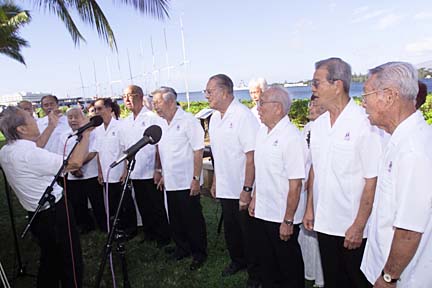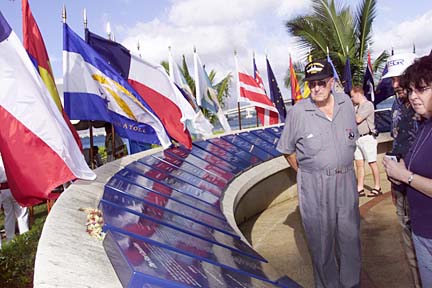


|
Japanese-American Hearing Japanese-American soldiers recount their World War II experiences of fighting for a country that considered them alien enemies was an eye-opening experience for an Illinois couple visiting the Arizona Memorial.
vets recall
WWII prejudices
Their stories tell of a time when
they were considered enemies,
not heroes, by AmericaWWII foes embrace
By Leila Fujimori
lfujimori@starbulletin.com"I had my own prejudices against the Japanese because of what happened (at Pearl Harbor)," said JoAn Langie, 62, of Peoria, Ill. "But that needs to change."
"It's sad what we do to each other, and here we are right back in it again," said Langie, with her husband, Jack, 65.
They were referring to concerns by their Turkish son-in-law about possible backlash since the Sept. 11 attacks.
"Sometimes we unconsciously treat people differently, and we don't even realize it," she said.
Ed Ichiyama, a veteran of the all-Japanese-American 442nd Regimental Combat Team, was among three World War II veterans who addressed visitors at the Arizona Memorial Visitor Center yesterday, the second day of a weeklong commemoration of the 60th anniversary of the Pearl Harbor attack.
He recalled how the government rounded up hundreds of Japanese-American community leaders in Hawaii and the Western states. Whole families on the West Coast, including his wife's, were interned in tarpaper barracks surrounded by barbed wire and armed guards.
"They were guilty by association," he said. "They looked like the enemy."
Civilians like Ichiyama could not join the military because he was classified 4-C, which meant enemy alien.

|
But a campaign was launched to allow Japanese Americans to serve in the military. A call for 1,500 volunteers in 1943 resulted in 10,000 volunteers from Hawaii and internment camps.He said those who volunteered from the camps "made the ultimate sacrifice to protect liberty and freedom they were denied."
"Our mission was simple: to prove our loyalty to the United States," Ichiyama said.
Shigeo "Doc" Kawamoto, 84, a former demolitions expert, walks with a cane after stepping on a land mine in France, paralyzing his lower right leg.
Yesterday, he recalled watching the bombing of Pearl Harbor from Red Hill, where he worked as a civilian steel rigger on an underground fuel tank.
When he went home, the Wheeler Air Field guards had stopped all Wahiawa-bound traffic and took his identification badge away. "They thought I was an alien," he said.
Hideo Nakamine, then 19, happened to be visiting his brothers in Honolulu from a Honokaa sugar plantation.
"The radio said Pearl Harbor is bombed," he said. "We got in the car and went up Kam Heights. We could see the ships explode and lift up.
"At first I was angry, as a Japanese-American citizen, that the Japanese would do such a thing. I was ashamed and thought we would take criticism from other nationalities."
But Nakamine said that never happened to him. Instead, his Portuguese and Filipino neighbors said to call them if anyone gave his family trouble.
Nakamine served as a machine-gunner in Italy, France and Germany with the 522nd Field Artillery of the 442nd.
His sergeant, Yuzuru Morita, was already serving with the 100th Battalion before the Pearl Harbor attack.
He and his brother had climbed atop the roof of their Waipahu house to see the Arizona burning and overturned battleships in Pearl Harbor.
In 1942, those in the 100th Battalion were told to pack their bags and be ready to leave, he said. "We saw all the Japanese-American soldiers being loaded on ships," he said. "We didn't know where, to concentration camps or military bases."
Morita served in Hawaii until volunteering with the 442nd.
Ichiyama pointed out that more than 60,000 Asians and Pacific Islanders, not just Japanese Americans, had not been properly recognized until recently.
He ended by saying, "All of us, particularly we AJAs (Americans of Japanese ancestry) who were victims of racism during the Pearl Harbor years, must fight the good fight to combat racism which has since been directed toward Arab and Muslim Americans."